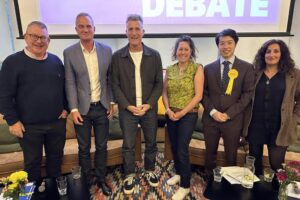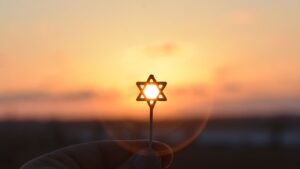In the wake of the recent article, My Experience with Na’amod by Rabbi Andrea Zanardo, featured in Sussex Jewish News, I felt compelled to share my perspective and, more importantly, my story. This is not just an abstract discussion for me; it’s deeply personal. My family lost a nephew, Nehorai Sa’id, on October 7th. He was killed by Hamas while trying to protect his family and community. This loss shapes my commitment to seeking peace, understanding, and unity in our fractured world.
I want to clarify that while I am not a member of Na’amod, I did attend the hustings mentioned in the article. I believe I am the person referred to when accusations were made about certain interactions at the event. I was accused of callous indifference towards the pain of a Jewish child. Further, this was equated with the horror of kidnapped Israeli children being taunted by Palestinians on October 7th. Such comparisons not only misconstrue my intentions but also miss a crucial opportunity for understanding and dialogue.
After the event, I reached out to the author of the article, Rabbi Zanardo, with the hope of clearing the air. My message was simple: I wanted to meet, Jew to Jew, Israeli to Israeli, to share what I experienced and to better understand his perspective.
I was disappointed not to receive a response. The absence of dialogue only reinforces the very divisions that continue to plague our community. We need to create spaces where people can respectfully disagree, especially within the Jewish community.
At the hustings, my goal was not to disrupt or heckle, as was implied. I raised my voice once, to support the Green Party candidate and clarify the goals of Parents for Palestine, a group committed to ending the siege and occupation in the region. However, I was taken aback by the hostile reception that I and others received. We were called “disgusting” and “traitors” and filmed aggressively. This was a far cry from the welcoming environment promised on the BNJC website.
One of the more hurtful accusations was that I mocked the Rabbi and his son with Yiddish phrases. I want to set the record straight: the only thing I said to them was B’hatzlacha, a Hebrew word meaning good luck. This was a sincere and positive wish, not an attempt to mock, exclude, or disrespect anyone—least of all a child.
Equally troubling were the comments on the Rabbi’s Facebook page equating Na’amod and Jewdas with conspiracy theorists and anti-vaxxers, and suggesting that supporters of these groups are not “real Jews.”
As someone who grew up in an Orthodox family, attended Jewish schools, and studied at Yeshiva in Israel, I know that this has no basis in Jewish law or tradition. Jewish identity is enduring, even in cases of conversion or heresy. The notion that political disagreements could strip someone of their Jewishness is deeply concerning.
Rabbi Zanardo has every right to hold and express his political views. But as a leader within our community, he also has a responsibility to foster inclusion, not division. Judaism has long thrived on debate, but that debate has always been grounded in mutual respect. When we demean fellow Jews or question their Jewishness, we cross a line that undermines the very fabric of our community.
I am heartbroken by the antisemitism that the Rabbi’s son faced in his school. No child should ever experience such hatred, and I would never support or tolerate any form of discrimination. At the hustings, I heard no antisemitic or anti-Sephardic remarks. My wish for his son, B’hatzlacha, was genuine and well-intentioned.
I renew my invitation to Rabbi Zanardo for a conversation. I also extend that invitation to anyone in our community who is willing to engage in respectful dialogue.
Now, more than ever, we need to come together. We need to create spaces where every Jew feels welcome, no matter their political beliefs. And we need to remember that our shared identity, our shared values, and our shared history as a people are far more important than the differences that divide us.
Let’s choose dialogue over division. Let’s choose understanding over alienation. And let’s work together to build the compassionate, inclusive community that we all desire.


